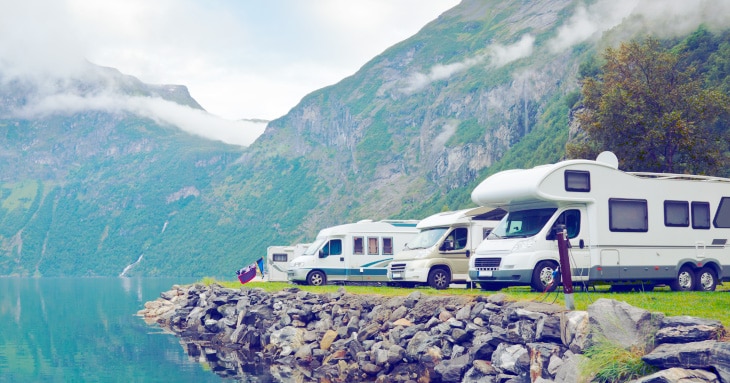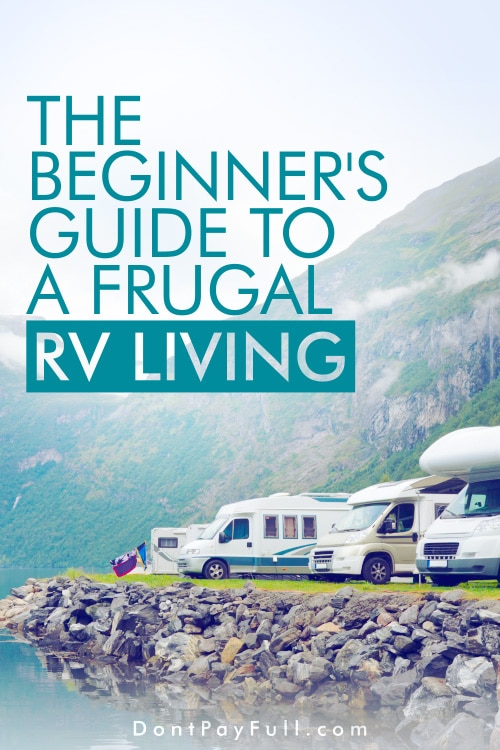You can save by living in an RV – but if you pick a five-star option, you may even end up paying more! Before you decide if RV living is for you, consider the following:
- How much will buy an RV (and financing your purchase) cost you on a month-to-month basis and overall?
- What can you expect to pay at camping grounds that are convenient to your workplace or school?
- Remember to factor utility costs into the equation.
- RV’s need regular maintenance. This cost varies depending on the mileage you plan to travel and the type of RV you choose.
Let’s suppose you choose a reasonably priced RV and live in a relatively standard camping ground without moving around much. You could save big time – Wanderly Magazine says you could save $1,000 per month or more. But how can you be sure?
In this guide...
Prepare your budget
Compare your current living costs with the budget you’ll need to live in an RV. Remember to check on things such as petrol costs to work or to get to the shops as well as all the direct costs involved in living in an RV. Careful budgeting should give you a clear-cut answer: will RV living be cheaper for you?
HeathPadgett, a popular RV blogger, says that RV living is ideal for a young couple. A one bedroom apartment in Austin would have cost him and his girlfriend on average over $13,000 rental per year while the expense of a small RV was just $11,000.
Add to that extra costs like camping fees and assuming that the couple paid cash for their RV, there’s a chance of significant savings, especially if commute costs remain reasonable, and they stay in their RV for two years or more.
Why living in an RV can help you save
As I have said, you can buy a really expensive RV on credit, live in premium camp grounds and end up paying more than you would in a house or apartment, but if you exercise moderation in your choice of vehicle and location you can save because:
- You won’t have room for many possessions – or the upkeep and insurance costs that go with them.
- You don’t need to pay for furniture and appliances – they’re built in or offered on your camping ground.
- You don’t have to pay property tax, and the campground owners cover the gardens and amenities.
- You only have to insure your RV. That skips a lot of the insurance costs that homeowners pay.
- It’s easy and cheap to relocate – good news if your work requires regular moves from city to city.
- If you’re often on the road, your fuel costs will be higher, but you won’t have to pay for expensive hotels.
If you’re an e-commuter, you’ve got it made
If you’re making your money online, the RV lifestyle can really help you to live cheaply. The further out of town you go, the cheaper the camping is, and as long as you have your internet options sorted, you can work in beautiful surroundings.
You can even move from place to place, enjoy your time off in a varied environment without the high costs most people associate with vacations. You could pay less than $500 per month for your accommodation and appreciate an enviable lifestyle!
Work as you go
RV parks love employing full-time RV-ers for everything from admin tasks to handyman jobs. If you’re young and on the road, that’s the way to go to get a paid working vacation that lets you take in all the sights and get paid to do it! A lot of full-time RV-ers follow the festivals, selling arts, crafts, clothes or food at festivals around the US. That’s a fun lifestyle, and while you save, you also earn.
Pick your state
If you live in South Dakota, you don’t pay income tax. If you’re an RV-er, you can choose your home base. It’s easy to see where this is going. Travel where you like, and pick the state that offers you the best tax benefits! The more you earn, the more you save.
Careful planning is critical
How you live, how much you travel, the RV you choose and where you park it, will all make the difference between an RV saving you money or actually costing more. The Jewish Journal points out that the RV lifestyle can really be a whole lot more expensive than living in an apartment because of:
- Purchase and financing costs
- Depreciation
- Gas cost
- Camping costs
- The cost of RV accessories
- Insurance costs (they don’t compare household insurance cost here)
- Propane gas costs
However, an overwhelming percentage of bloggers and RV-ers say that the RV lifestyle is saving them a lot of money.
It all comes back to individual circumstances, what you buy, how you buy it and how you run it.
Pin it for later:








